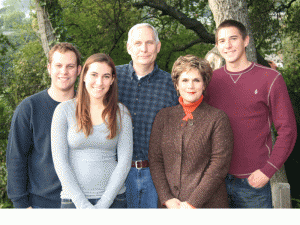By SUZANNE McNAMARA
CASA GRANDE HIGH SCHOOL, 17, JUNIOR
He should be driving his little sister home from school every day, he should be making sure no one picks on her, he should be checking up on her boyfriend, making sure he is good enough for her — being a big brother.
Instead, he is being driven home by his little sister, she is making sure no one picks on him, and she acts as the older sibling.
My brother, David McNamara, was diagnosed with late-onset autism before his fourth birthday. Growing up with him was not easy but without him I would not be who I am today.
I would not wake up early on Saturday to go to Special Olympics

The McNamara family, from left, David, Suzanne, Diane and Chris. David McNamara, now a senior in high school, was diagnosed with late-onset autism before his fourth birthday. Photo courtsey of McNamara family.
basketball practice, I probably would not be Best Buddies Chapter president, and I would not have realized why helping others is so important.
I sit through movies for 6-year-olds. But most of the time, it makes David’s day. I deal with his complaining even when it comes after letting him eat the last piece of cake, after spending Friday night watching whatever movie (“Godzilla”) he has in mind and after letting him rock out to his music when I wanted to take a nap in my room next to his.
When I think about all the times he has asked the heartbreaking question, “Why don’t I have any friends?” I realize I have no right to let him be sad and lonely when it could have been me with autism.
Growing up with David, my brother Chris and I both had stages when we neglected him. We would be embarrassed by him, let our friends make fun of him. We would be tired of him and start to bug him. All we had to do was push one of the armrests in the family van up, and we would get a rise out of him. He believed that if they were up, we were all going to die.
A mother of a son with autism said in a Newsweek magazine article entitled “Autism: What Happens When They Grow Up?” that “I have to keep laughing. Otherwise, I would cry.”
My family, and anyone with a loved one with autism lives with this contrast between laughter and tears on a daily basis. It is difficult not to cry sometimes: To accept that things just are not the same and you never can know, “What happens when they grow up?”
I see all of David’s capabilities not his disability. And this is why it is so hard to think about his future.
This is David’s senior year. My parents are in one of the most difficult times of their lives. They think every night, “What is he going to do?” “Where is he going to go?” They have to decide soon. He does not have many options. He doesn’t have the same options that most of us take for granted.
It breaks my heart every time I see people with disabilities picking up our lazy students’ trash.
Why is that OK?
Why is it OK for one group of people to be able to litter all over the school? Because the people of Old Adobe Developmental Services will come clean it up? It gives them something to do right?
No. It is not right that one person is able to slide through school while another person struggles every day trying to get a diploma, that one person is able to get a decent paying job while the other does the dirty jobs for minimum wage.
I want David to have a job he likes, one he is good at and one that is more than just a job for someone who is disabled.
I know he is capable of so much more.
My hope for David is that he is able to find contentment and joy in his life, whether it is working in a Godzilla Museum in Tokyo or acting with a professional team. He is so capable, empathetic and cheerful that I want him to find a creative outlet for all of his talent.
This story was reprinted from Casa Grande High School’s Gaucho Gazette.
